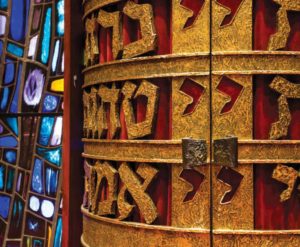Introduction
Marvin Wilson offers an excellent description of the gap or “impasse” between Jews and (evangelical) Christians, diagnosing its causes and helpfully pointing toward ways to increasingly bridge it. In what follows, I would like to offer a few reflections from the perspective of one who quite literally lives in the gap.
As a Messianic Jew, or Jewish follower of Yeshua (Jesus), I do not neatly fit into either of the camps Wilson describes; rather, in some profound sense, I belong to both. I was raised in a Jewish home, celebrating Passover and lighting Hanukkah candles and, on occasion, attending synagogue. In college, through a nurturing group of faithful Christian friends, I became a follower of Yeshua. Since then, both personally and professionally, I have been on a quest to discover how these two religious traditions, which have long been averse to one another, can once again fit together. I resonate deeply with the way a good friend once described it, to borrow his words, “asking me to choose between Judaism and Christianity is like asking me to choose between my heart and my lungs.”
Messianic Judaism is a diverse movement, and the moniker means different things to different adherents. The spectrum of Messianic Judaism ranges from a form of Christianity with select Jewish trappings to a form of Judaism that seeks to know and honor Messiah Yeshua through the vehicle of traditional Jewish life.
Our community in Jerusalem falls on (and perhaps defines) the latter end of the spectrum. Naturally, the rhythm of our year revolves around the Jewish calendar and Jewish holidays. Kids are off school for a week for Sukkot (Feast of Tabernacles) and Pesach (Passover), and December 25 is just another day. Many in our community attend traditional (Orthodox) Jewish synagogues, most of the men wear yarmulkes, and many of them put on tefillin (phylacteries) and pray the traditional Jewish liturgy three times a day.
In many ways, the very existence of a community like ours defies the divide that Wilson describes. As Jews, we believe that knowing Yeshua as Messiah should draw us closer to Judaism (which is, after all, the religion of Yeshua and his first followers) not farther away from it.
The Messianic Jewish movement provokes a number of questions, both with regard to the traditional parameters of Jewish-Christian dialogue as well as what faithful discipleship looks like for Jewish followers of Yeshua. Let us briefly explore each of these areas.
Messianic Jews and Jewish-Christian Dialogue
While the current milieu of Jewish-Christian dialogue ranges from partnering on initiatives of shared interest to rigorous theological engagement, the role of Messianic Jews has continually posed a curious dilemma for proponents of improved Jewish-Christian relations. Both sides have had a difficult time mapping Messianic Jews on the religious landscape, as Messianic Judaism categorically blurs the lines that the dialogue has come to depend upon. If the dialogue is about reaching across differences and gaining mutual understanding, those differences must be clearly defined.
The dawning of the Messianic Jewish movement in the twentieth century represents the reemergence of an overlapping segment of these two communities that has not existed in visible form since the proverbial parting of the ways. Messianic Judaism challenges the nature of the divide that Jews and Christians so often take for granted. By blurring these historically reinforced dividing lines, Messianic Judaism suggests that this divide represents not a value-neutral and perhaps inevitable development, but rather a tragic rupture in the one people of God.
If this is the case, an additional goal of Jewish-Christian dialogue is arguably the healing of a historically entrenched schism. Within this framework, Messianic Judaism need not be statically defined as merely a syncretistic nuisance that transgresses mutually relied upon boundaries. It may instead be viewed as a key component in the bridging of a destructive and distorting chasm.
The emergence of the Messianic Jewish movement in the latter half of the twentieth century coincides with the widespread constructive reengagement between Christians and Jews. The same tumultuous history between Judaism and Christianity that led to the mutually exclusive reality in place today has also disallowed for the existence of Messianic Judaism. In an atmosphere in which the relationship between Judaism and Christianity is being thoroughly reconsidered and reconceived, the role of Messianic Judaism requires to be similarly reevaluated.
There are indications that such a reevaluation is beginning to take place, and Messianic Judaism is slowly establishing a seat for itself at the table of Jewish-Christian dialogue. In 1988, Messianic Jewish pioneer David Stern wrote the following: “I am confident that the Messianic Jewish community will be a major means for healing the worst schism in the history of the world, the split between the Christians and the Jews, while helping both to fulfill their God-given callings.” Perhaps we are just now beginning to see the fulfillment of Stern’s prophetic vision.
While Wilson takes some significant steps in the direction of meaningful Jewish-Christian relations and dialogue, Messianic Judaism requires us to question the mutually exclusive (and widely accepted) division between Judaism and Christianity. If indeed there is a small but arguably theologically significant segment of overlap between these two communities, it seems we need to, at the very least, amend our approach to dialogue.
Covenant Faithfulness for Jewish Followers of Yeshua
I will never forget the interfaith dialogue retreat that forced me to claim an identity I had been struggling to embrace. For several years after college, I fully embodied evangelical Christianity and felt alien in the Jewish world of my upbringing. But, as time passed, I began to feel a beckoning back to the heritage I had left behind. I realized that my Christian identity had left no room for my Jewish identity, and I increasingly felt a longing that I could not ignore.
I showed up at this particular retreat as a representative of evangelical Christianity, but as the days went on I was surprised to discover myself feeling more at home in the Jewish space and Jewish liturgy than among my own Christian delegation. That experience turned out to be a significant moment in my realization that, for me, to follow Yeshua authentically meant to follow him as a Jew.
Christian theology has a long history of dichotomizing “faith/grace” and the “law.” In Christian contexts, “legalism” is practically a dirty word, for it is perceived as being diametrically opposed to the life of freedom Christ offers to us. However, from a Jewish perspective, a life of Torah (i.e., “law”) represents the fullest—and most free—life possible. Indeed, these traditional Christian categories need to be reworked.
I invite my evangelical Christian friends and students to consider again what Torah means, especially to the Jewish people. I invite them—and you—to reread what the Psalms have to say about the Torah and, when reading Scripture, to replace the word “law” with Torah, or teaching. Consider, for example, this passage from the Jewish morning prayer liturgy, which draws from Psalm 111, Deuteronomy 33, and Proverbs 1:
“Wisdom begins in awe of the Lord; all who fulfill His commandments gain good understanding; His praise is ever-lasting. The Torah Moses commanded us is the heritage of the congregation of Jacob. Listen, my son, to your father’s instruction, and do not forsake your mother’s teaching. May the Torah be my faith and Almighty God my help. Blessed be the name of His glorious kingdom for ever and all time.”
If obedience to Torah is indeed the heritage of the Jewish people, and faith in Yeshua does not nullify this call to covenant faithfulness, I believe it is the role of the church to encourage ongoing Torah faithfulness among baptized Jews. According to Orthodox Jew and interfaith dialogue pioneer Michael Wyschogrod, this is the true test of whether or not the church has wholly abandoned supersessionism. As Kendall Soulen explains,
“for Wyschogrod, the acid test of the church’s theological posture toward Israel’s election is the church’s conduct toward Jews in its own midst, that is, toward Jews who have been baptized. For it is here that the church demonstrates in an ultimate way whether it understands itself in light of God’s eternal covenant with the seed of Abraham. If the church acknowledges the abiding reality of Israel’s corporeal election, it will naturally expect baptized Jews to maintain faithfully their Jewish identity. But if the church truly believes that it has superseded God’s covenant with Israel, it will prohibit or discourage Jews from preserving their identity as Jews and members of the Jewish people. In short, the problem of supersessionism turns on the church’s capacity to acknowledge the abiding religious significance of Israel’s corporeal election and hence the abiding religious significance of the distinction between Gentile and Jew.”1
Soulen’s words challenge the church to think in a new light about the Jews in her midst. If God is honored by Torah-faithfulness among the people of Israel, then Jewish followers of Yeshua should be encouraged to increasingly discover and live out the richness of Jewish life.
The very real existence of Messianic Judaism and communities like ours presents an entirely new set of questions to Christians in our day. It is my hope that alongside the continued strengthening of Jewish-Christian dialogue would come increased reflection on the overlapping of these two communities and increased evaluation—rather than mere acceptance—of the schism between them.
ENDNOTES
1R. Kendall Soulen, The God of Israel and Christian Theology (Minneapolis: Augsburg Fortress, 1996), 11.


